
Shutterstock.com
Despite bringing in tougher regulation, experts say health leaders in England will need to do much more to hit their own targets on reducing harm to unborn babies from exposure to sodium valproate.
An analysis of data from the Medicines and Pregnancy Registry by The Pharmaceutical Journal has revealed that NHS England has reduced the number of female patients who can become pregnant taking sodium valproate, from 27,411 in April 2018 to 19,766 in March 2022 — a 28% reduction.
However, to meet its own 50% reduction target, the health service in England would need to reduce this figure by almost the same again by the end of 2023 (to 13,705), and experts say more urgent action is needed.
In December 2022, the Medicines and Healthcare products Regulatory Agency (MHRA) announced that new safety measures would be introduced “over the coming months”, including the sign-off of two independent specialists before any patient aged 55 years or younger is initiated on sodium valproate.
However, Henrietta Hughes, patient safety commissioner for England, told The Pharmaceutical Journal that she was “very disappointed” that so many patients were still taking sodium valproate while at risk of pregnancy.
“The target to halve the number set by NHS England is unlikely to be met and patients are not always informed of the harm that can occur. Three babies a month are still being born after exposure to sodium valproate. This is a far bigger scandal than thalidomide,” she said.
“The government urgently needs to listen to patients, commit to financial redress for families who have suffered and not kick this issue into the long grass.”
In women who take valproate while pregnant, around 10% babies will have a birth defect, such as spina bifida or a cleft lip and palate, and about 30–40% children may have developmental disorders, such as poor speech or lower intelligence.
According to the most recent data, between December 2018 and March 2022, 78 women in England were taking sodium valproate during the month their baby was born. Of these, 6 were during the first three months of 2022.
In July 2021, the government rejected recommendations to set up a redress scheme for people who experienced harm and have additional needs as a result of sodium valproate.
In December 2022, an update report on government implementation of the recommendations, laid out in the Independent Medicines and Medical Devices Safety Review (IMMDSR), said that the government had “no plans to establish an independent redress agency” and that its priority was to “making medicines and devices safer through a wide range of activities”.
The report said that the government had worked with NHS Resolution to launch two claims gateways to provide further support to patients who may wish to bring a clinical negligence claim in relation to sodium valproate.
Daniel Jennings, senior policy and campaigns officer at the charity Epilepsy Action, said that while it was “concerning” that NHS England was some way off meeting its target, it remains the case that, for some people with epilepsy, valproate is the only medication that works to control seizures.
“NHS England should seek to ensure that all people with epilepsy are aware of the risks of taking sodium valproate, so they can make an informed choice about their treatment,” he said.
“Unfortunately, despite the efforts of NHS England, [the] MHRA and others over recent years, we are aware that there are some people who remain unaware of these risks.
“We also need to see more research into new treatments for epilepsy to give people currently taking sodium valproate more viable and safe alternatives to this and other epilepsy medicines currently available. Until we have these alternatives, there will be people with epilepsy for whom sodium valproate is the only medicine that effectively controls their seizures.”
Since publication of the IMMDSR, NHS England says it has taken forward work to improve care pathways for children and families adversely affected by medicines in pregnancy.
It also set up the ‘Valproate Safety Implementation Group‘ to coordinate the programme of work to reduce the use of valproate in people who can get pregnant by 50% by 2023.
A spokesperson for NHS England said: “The NHS has established an expert group to help reduce the prescription of valproate to women and girls who could get pregnant, and new rules coming into force next year will mean no patient under the age of 55 [years] will be prescribed it unless two specialists agree it is the only medication available, which will make a further significant contribution to reducing use.
“The NHS has also written to all women and girls aged between 12–55 [years] in England on the medication to remind them of risks of taking it while pregnant, and is working with its partners on initiatives to further reduce valproate risks.”
1 comment
You must be logged in to post a comment.



Sodium valproate preparations should be classified as "special containers" so they are never issued in white boxes and always have the manufacturers warning clearly visible.